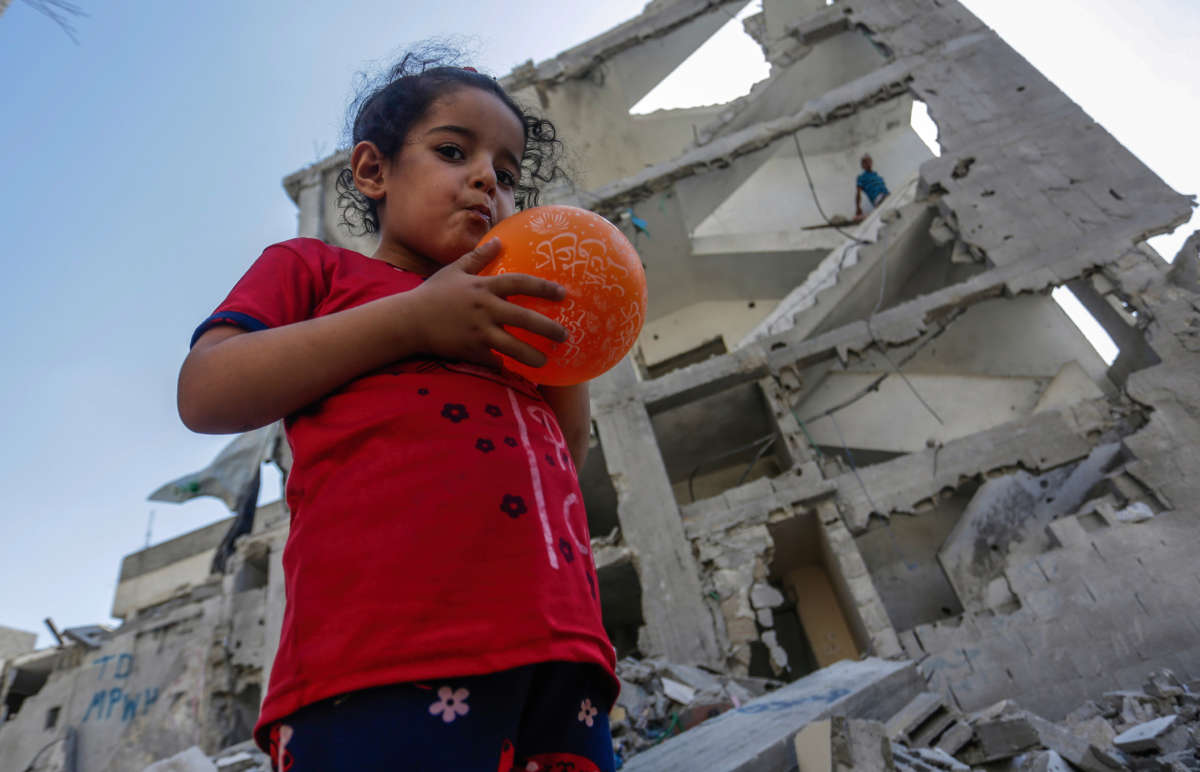Calling for the International Criminal Court to open a new investigation into possible war crimes by Israeli military forces in Gaza in August, Amnesty International on Tuesday said the court must also include Israel’s illegal apartheid policies against the Occupied Palestinian Territories in its probe.
The organization’s call centered on the three-day offensive launched by Israel between August 5-8 in the Gaza Strip, with advocates saying its research suggests three specific attacks could amount to war crimes.
Seventeen civilians were among the 49 Palestinian people who were killed by Israeli forces during the offensive, while seven were determined to have been killed by Palestinian rockets that were likely misfired. The group could not determine which side was responsible for the deaths of seven other civilians.
Amnesty noted that Israel, which claimed the attacks were “preemptive” and targeted the Palestinian Islamic Jihad organization, has set the stage for such deadly assaults on civilians for years by imposing a blockade and other apartheid policies on Gaza.
“These violations were perpetrated in the context of Israel’s ongoing illegal blockade on Gaza, which is a key tool of its apartheid regime,” said Agnès Callamard, Amnesty International’s secretary general, in a statement. “Palestinians in Gaza are dominated, oppressed, and segregated, trapped in a 15-year nightmare where recurrent unlawful attacks punctuate a worsening humanitarian crisis.”
“As well as investigating war crimes committed in Gaza, the ICC should consider the crime against humanity of apartheid within its current investigation in the Occupied Palestinian Territories,” Callamard added.
The group said Israel’s policies — including military control of Palestine, restrictions on the movement of millions of people in the West Bank, and denial of essential services — are the “root cause of Palestinians’ suffering.”
Israel’s apartheid remains the root cause of Palestinians’ suffering and the recurring violations against them and must be dismantled.https://t.co/h5UZTsnYmU
— Amnesty International (@amnesty) October 25, 2022
The call comes eight months after Amnesty outlined Israel’s apartheid system in a report, saying “the international community and the ICC should all investigate the commission of the crime of apartheid under international law.”
In its report released Tuesday regarding the three-day offensive that took place in August, the group said it had interviewed 42 people including attack survivors, family members of those killed, eyewitnesses, and medical professionals. A fieldworker, the organization’s evidence lab, and a weapons expert determined that at least three of the 17 attacks Amnesty documented should be investigated by the ICC as possible war crimes.
An Israeli tank fired a projectile on August 5, hitting the home of 22-year-old art student Duniana al-Amour and her family in the southern Gaza Strip. Al-Amour was killed and her mother was wounded. Amnesty concluded in its analysis that the family’s home had been “deliberately targeted,” even though there is “no evidence that any members of the al-Amour family could reasonably be believed to be involved in armed combat.”
Five children were killed on August 7 when a missile struck Al-Falluja cemetery, near the Jabalia refugee camp in northern Gaza. The children ranged in age from four to 16.
Israel initially blamed Palestinian Islamic Jihad for the attack, but Haaretz reported days after the children’s deaths that “neither Palestinian Islamic Jihad nor the Al-Quds Brigades were firing rockets at the time of the attack.”
“Israel, however, had reportedly been attacking ‘targets’ near the area,” reported Amnesty. “Since the publication of the article, the Israeli army has neither confirmed nor denied these reports.”
“The absence of apparent military targets indicates that the strike may have been a deliberate direct attack on civilians or civilian objects, and could therefore constitute a war crime,” said the group. “Even if Israeli forces had been targeting Palestinian fighters or military equipment when they hit the cemetery, the horrifying outcome requires an urgent investigation into whether all feasible precautions were taken to protect civilians.”
The final attack documented in the report was at Jabalia refugee camp on August 6, and killed seven civilians ranging in age from six to 50. Researchers identified similarities between the attack and “previous strikes which have been attributed to Palestinian armed groups,” concluding the attack was consistent with past firings of indiscriminate rockets, which are “inherently inaccurate” and whose use “in civilian areas violates international humanitarian law.”
Muhammad al-Neirab, whose son was among those killed at the refugee camp, “was one of many people who alluded in interviews to hardships caused by Israel’s illegal blockade, such as power cuts and lack of space,” reported Amnesty.
“It was a hot summer evening and we had the usual power cut, so the children could not stay at home, which is very small and suffocating especially when there is no electricity,” said al-Neirab. “At 9:02 pm, the street was hit. It was filled with wounded people, with blood, with shrapnel.”
The humanitarian crisis caused by the blockade was worsened during the fighting as it forced “Gaza’s sole power station to shut down for two days,” said the group, adding that “more than 1,700 housing units were damaged during the fighting, leading to the internal displacement of some 450 Palestinians.”
Speaking against the authoritarian crackdown
In the midst of a nationwide attack on civil liberties, Truthout urgently needs your help.
Journalism is a critical tool in the fight against Trump and his extremist agenda. The right wing knows this — that’s why they’ve taken over many legacy media publications.
But we won’t let truth be replaced by propaganda. As the Trump administration works to silence dissent, please support nonprofit independent journalism. Truthout is almost entirely funded by individual giving, so a one-time or monthly donation goes a long way. Click below to sustain our work.
